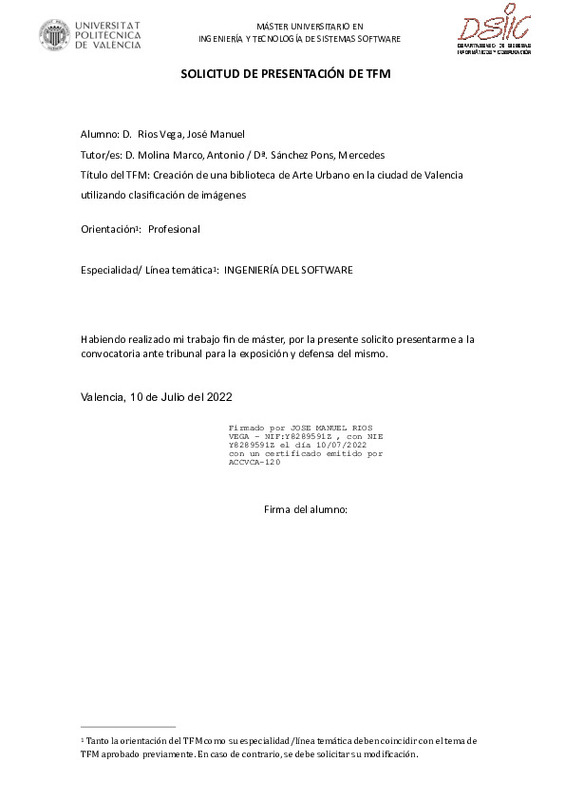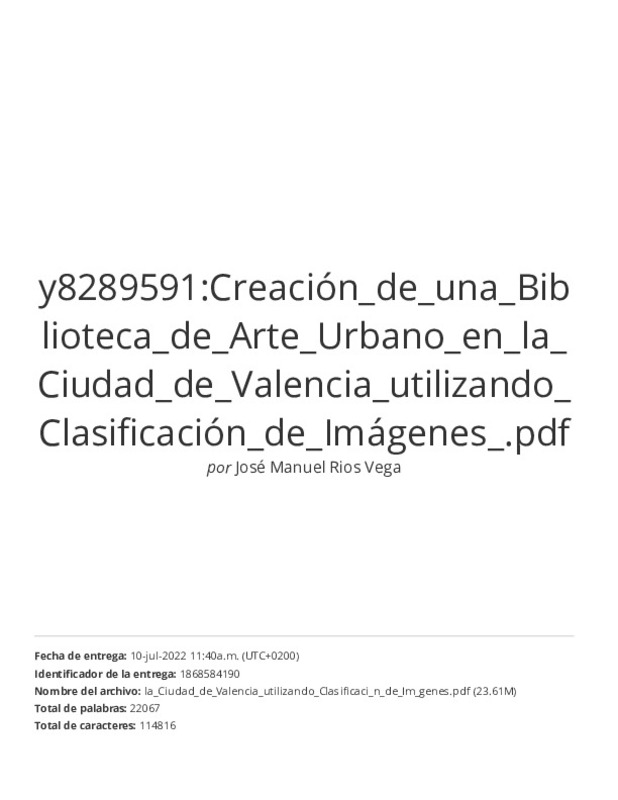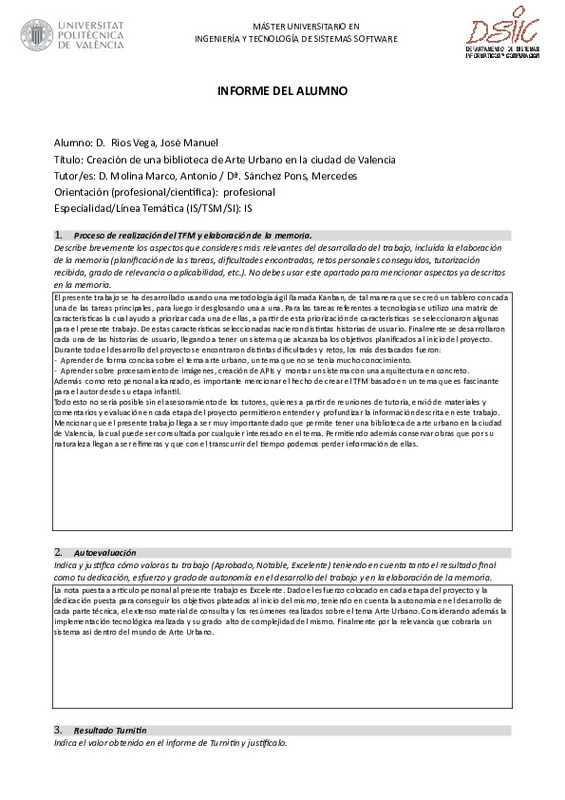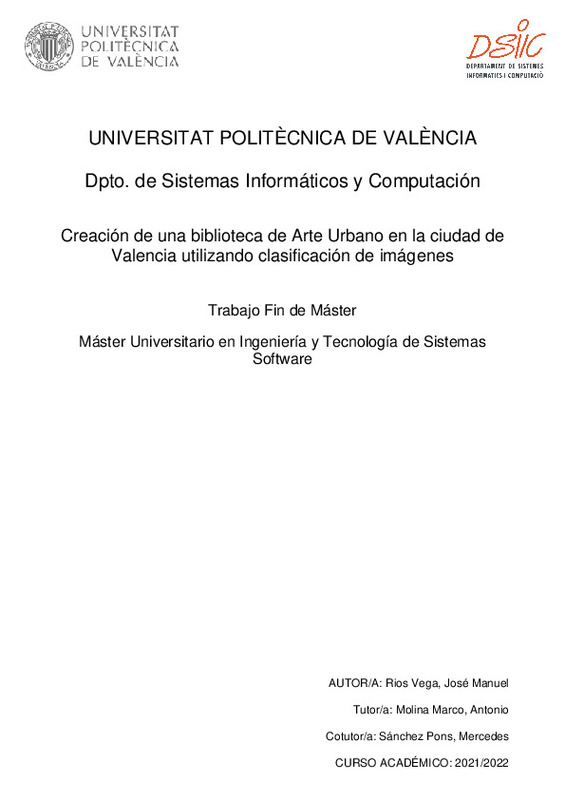JavaScript is disabled for your browser. Some features of this site may not work without it.
Buscar en RiuNet
Listar
Mi cuenta
Estadísticas
Ayuda RiuNet
Admin. UPV
Creación de una biblioteca de Arte Urbano en la ciudad de Valencia utilizando clasificación de imágenes
Mostrar el registro sencillo del ítem
Ficheros en el ítem
| dc.contributor.advisor | Molina Marco, Antonio
|
es_ES |
| dc.contributor.advisor | Sánchez Pons, Mercedes
|
es_ES |
| dc.contributor.author | Rios Vega, José Manuel
|
es_ES |
| dc.date.accessioned | 2022-09-13T12:06:20Z | |
| dc.date.available | 2022-09-13T12:06:20Z | |
| dc.date.created | 2022-07-20 | es_ES |
| dc.date.issued | 2022-09-13 | es_ES |
| dc.identifier.uri | http://hdl.handle.net/10251/185912 | |
| dc.description.abstract | [ES] El arte urbano ha comenzado a crecer en gran medida en los últimos años provocando que lo que antes se consideraba prohibido llegue hoy en día a ser una fuente de ingresos más y potenciando de esta forma el turismo, el surgimiento de nuevos artistas y el embellecimiento de las ciudades. La ciudad de Valencia es considerada en España como una de las ciudades más importantes en relación al arte urbano, llegando a colocar a muchos artistas y sus obras en la mira mundial. Sin embargo, no se puede entender el arte urbano si no salimos a recorrer sus calles y a experimentar cada pieza de arte. Por lo tanto, surge la necesidad de encontrar mayor información de cada graffiti y sus variantes además de tener recorridos que permitan recorrer los grafitis basado en temáticas o importancia. Todo ello de manera simple y clara. Además se necesita tener mayor información de los artistas que han creado dichas piezas y hacerlas visibles al mundo. A pesar que ciertos blogs han incluido en su contenido la temática de street art, estos no están especializados en la misma. Si bien existen algunas páginas que se enfocan al graffiti su información es muy global y sólo consideran obras actuales, en otros casos estas páginas sólo están en instagram o facebook y publican mediante post artículos y obras. Para solucionar esto se pretende crear una aplicación web que permita mostrar diversa información sobre el arte urbano, permitiendo a los usuarios alimentar la base datos con fotografías e interacciones, de tal manera que se pueda analizar cada imagen utilizando clasificación de imágenes, análisis de localización y metadatos de cada imagen; permitiendo de este modo etiquetar las imágenes y agruparlas para luego con dicha información poder obtener rutas inteligentes con temática y/o categorización. Adicionar a ello la aplicación web pretende ser una biblioteca de arte urbano que permita consultar sobre obras y sus detalles. Y teniendo en cuenta que este tipo de arte es vulnerable pues tiende a desgastarse y perderse con el tiempo, siendo reemplazada o eliminada de las calles y edificios donde se encuentre; la aplicación pretende ser un lugar donde se pueda mantener vivo el trabajo de muchos artistas y profesionales. Por último se pretende brindar una mayor visualización de cada artista y profesional, permitiendo ser una vitrina gestora de talento en temática urbana. Para poder llevar a cabo esta solución se aplicarán diversas tecnologías. Los algoritmos para el análisis de imágenes se construirán en Python mientras que el framework Backend sobre el que se soportará toda la lógica de negocio será Django y para la creación del API REST usaremos Django Rest Framework. Por el lado de Frontend se utilizará el framework de javascript ReactJs. La base de datos estará sobre postgreSQL para manejar la geolocalización con Postgis. Finalmente la metodología a utilizar será Kanban. | es_ES |
| dc.description.abstract | [EN] Urban Art has begun to grow in a large way in the last years, causing what was previously considered prohibited, to become another source of income and promoting tourism in the cities. The city of Valencia is considered in Spain as one of the most important cities in relation to urban art, placing different artists and putting their work in the global spotlight. However, urban art cannot be understood if we do not walk in streets and experience each piece of art. Therefore, we need a place where we can find more information on each graffiti, in addition to having walking routes based on themes or importance. All this in a simple and clear way. In addition, it is necessary to have more information about the artists who have created these pieces and make them visible to the world. Although certain blogs have included the theme of street art in their content, they are not specialized in it. Also there are some pages that focus on graffiti, but their information is very global and they only consider current works, in other cases these pages are only on instagram or facebook and publish articles and works through posts. To solve this, it is intended to create a web application, where the users to feed the database with photographs and interactions, in such a way that each image can be analyzed using image classification algorithm, location analysis and metadata of each image; of all that allowing to tag the images and group them, obtaining intelligent routes with themes and/or categorization. Adding to this the web application aims to be an urban art library that allows it to consult works and their details. Urban Art is a vulnerable art as it tends to wear out and be lost over time, being replaced or eliminated. The application aims to be a place where the work of many artists and professionals can be kept alive. Finally, it is intended to provide a greater visualization of each artist, allowing it to be a managerial showcase of talent in urban themes. In order to carry out this solution, I will apply different technologies. The analysis algorithms for images will be built in Python while the Backend where all the business logic will be supported, I will use the framework Django and for the creation of the REST API I will use the Django Rest Framework. On the Frontend side, I will use ReactJs, a javascript framework. The database will be on postgreSQL to handle geolocation with Postgis. Finally, the methodology to be used will be Kanban. | en_EN |
| dc.format.extent | 123 | es_ES |
| dc.language | Español | es_ES |
| dc.publisher | Universitat Politècnica de València | es_ES |
| dc.rights | Reconocimiento - No comercial (by-nc) | es_ES |
| dc.subject | Arte urbano | es_ES |
| dc.subject | Clasificación de imágenes | es_ES |
| dc.subject | Biblioteca digital | es_ES |
| dc.subject | Grafiti | es_ES |
| dc.subject | Urban Art | en_EN |
| dc.subject | Image classification | en_EN |
| dc.subject | Digital library | en_EN |
| dc.subject | Graffiti | en_EN |
| dc.subject.classification | PINTURA | es_ES |
| dc.subject.classification | LENGUAJES Y SISTEMAS INFORMATICOS | es_ES |
| dc.subject.other | Máster Universitario en Ingeniería y Tecnología de Sistemas Software-Màster Universitari en Enginyeria i Tecnologia de Sistemes Programari | es_ES |
| dc.title | Creación de una biblioteca de Arte Urbano en la ciudad de Valencia utilizando clasificación de imágenes | es_ES |
| dc.title.alternative | Creation of an Urban Art digital library in Valencia using image classification | es_ES |
| dc.title.alternative | Creació d'una biblioteca d'Art Urbà a la ciutat de València utilitzant classificació d'imatges. | es_ES |
| dc.type | Tesis de máster | es_ES |
| dc.rights.accessRights | Abierto | es_ES |
| dc.contributor.affiliation | Universitat Politècnica de València. Departamento de Sistemas Informáticos y Computación - Departament de Sistemes Informàtics i Computació | es_ES |
| dc.description.bibliographicCitation | Rios Vega, JM. (2022). Creación de una biblioteca de Arte Urbano en la ciudad de Valencia utilizando clasificación de imágenes. Universitat Politècnica de València. http://hdl.handle.net/10251/185912 | es_ES |
| dc.description.accrualMethod | TFGM | es_ES |
| dc.relation.pasarela | TFGM\149284 | es_ES |









